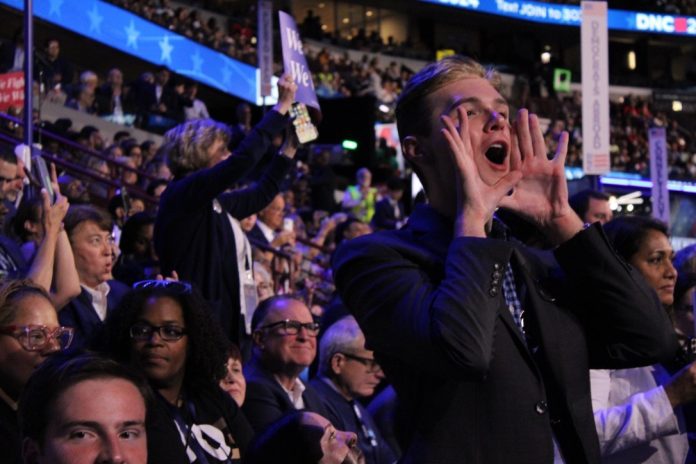It was only a month prior to Virginia’s First District Democratic Convention in May when Caleb Fulford ’24 decided to run for a delegate position that would represent the district at the 2024 Democratic National Convention in Chicago, Ill.
Despite strong competition from far more experienced former elected officials and local party chairs, Fulford finished with the most votes out of all candidates. He is now the First District of Virginia’s youngest ever delegate in history, as well as the youngest openly gay delegate in state history.
“It was tough coming in because of my youth, and I was by far the least well-known of the candidates there,” Fulford said. “So, I was coming in as the underdog and not really anticipating what would happen.”
Being in that underdog position, Fulford knew he had work to do. In the month leading up to the First District Convention, Fulford spent hours reaching out to community leaders and secured several endorsements from members of the Williamsburg and Norfolk city councils.
At the convention, Fulford and his friends stationed themselves outside the venue to hand out fliers and speak with voters. He leaned on his endorsements, internships, campaign work, and his education at the College of William and Mary as his qualifications to represent the district.
Coincidentally, the morning of the convention was the same day as Fulford’s graduation ceremony.
“The same day as my government graduation ceremony, that morning was the First District Convention. It was exciting being elected and then driving back to Williamsburg an hour later, putting on my cap and gown, and going to get my government [diploma],” he said.
Growing up in Chesapeake, Va., Fulford was fascinated by the history of his hometown. This interest in history later turned into a passion for constitutional law.
“The colonial and Civil War history that surrounds Chesapeake and with Williamsburg being a stone’s throw away, that’s the epicenter of early American history,” Fulford said. “Constitutional law is so grounded in the precepts of America at the time of the revolution, with the thoughts and conceptions of the founders.”
As Fulford got older, he came into the foreground of politics with the 2016 presidential election. Fulford realized that his foundation in history actively informed the election at hand to the highest level, motivating him from that point onward.
In junior year of high school, he volunteered for a political campaign for the first time in Vice President Kamala Harris’s 2019 Presidential Primary campaign.
“I was motivated to get into politics to protect the foundational freedoms and rights that we read about so early on. And yet those battles are still fought today,” he said.
At the College, Fulford looked to continue his involvement in congressional debate from high school. He found that outlet through Moot Court, competing in the national tournament twice and notching second-place in a regional tournament at Yale University.
Fulford was also involved in the Young Democrats and the William and Mary Writing Center, as well as serving on some community councils.
“William and Mary provided the opportunities, opening the door for connections with individuals whom I could really make a lasting impression on and introduce myself in a way that positioned me for post-graduation work life,” Fulford said.
During his time at the College, Fulford highlighted his experience with the College’s study in D.C. program. Through the Washington Center, he had the opportunity to work with Maryland Congressman Glenn Ivey.
Both his time spent working on political advocacy and in Moot Court have continuously fostered Fulford’s passion for constitutional law.
For Fulford, the core of his interest and advocacy in constitutional law involves reproductive rights, hence the topic of his honor thesis: “Roads Less Traveled: Abortion, Interstate Commerce, and the Post-Dobbs Politics of Travel.”
In his thesis, Fulford examined the legal and political implications of abortion travel bans in the aftermath of the Supreme Court’s Dobbs v. Jackson Women’s Health Organization decision.
“My view is: our founding purpose was the protection of individual rights and freedoms,” Fulford said. “I’m so actively involved in working toward correcting some of the recent mistakes made, in my view, by the Supreme Court involving IVF and reproductive rights.”
Being able to communicate topics like these is one of the many reasons why Fulford chose to run for a DNC delegate position.
At the DNC, Fulford attended fundraisers, delegation breakfasts and the main programming, where he listened to speeches given by Harris, President Joe Biden, Minnesota Gov. Tim Walz and more.
“The energy was potent, and I was first or second row sitting next to Senators Tim Kaine, Mark Warner and Congresswoman Abigail Spanberger,” he said. “Being able to speak with these folks in that environment was just pure euphoria. Just incredible changemakers from across our state who I’ve admired for four years.”
Fulford highlighted a full circle moment when he sat next to another delegate, Hala Ayala. Ayala, who was the 2021 Virginia Lieutenant Governor nominee, was one of the first people Fulford voted for as a legal voter.
“She was the first person I voted for as a voter,” Fulford said. “She was on that ballot and unfortunately, lost. But to be able to sit next to that person in the same room almost as an equal or peer, that’s insane.”
Coming back after the DNC, Fulford is working toward sustaining the relationships he made in Chicago and continuing his momentum. This includes getting lunch with local party chairs and furthering the connections he created at the DNC.
Fulford now works on several campaign efforts, including the Historical Triangle Democrats and the Leslie Mehta Congressional campaign, and helps organize efforts for various groups in areas like Williamsburg, Richmond and Henrico.
He emphasizes how critical it is for students at the College to vote, seeing how the campus lies directly at the heart of Virginia’s First Congressional District.
“There’s a million ways you can make a difference,” Fulford said. “The most important and the most valuable is your vote.”

